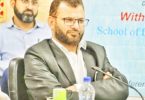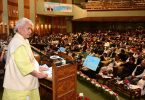GNK English News Desk
3 March 2023
UZBEKISTAN AND INDIA: CLOSE FRIENDSHIP, CULTURES, COMMON SCIENTIFIC RELATIONS
Muhammadjon Mamajonov
Fergana State University has regularly established cooperation relations with the Embassy of India in Uzbekistan. In particular, the “Indian Study Room” was established at Fergana State University in cooperation with the Indian Embassy in 2022. The ambassador of India to Uzbekistan Mr. Manesh Prabhat and Dr. Chandra Shekhar participated in the opening ceremony. Undoubtedly, the merits of the rector of the university, Shermuhammadov Bahadir Shermuhammadovich, should be singled out.

As a continuation of our cooperation, I was on a business trip to India from January 18 to 31 of this year. We were lucky to see India, which is considered a magical land, to talk with friendly Indian people, to visit the monuments constructed by our ancestors.
First, we started our business trip from Agra. We participated in the international conference “Uzbekistan and India: mutual cultural relations” held at St.John’s College in Agra.. The administration of the institution welcomed the delegation of Uzbekistan very festively, presenting with garlands following their tradition. Speaking of the cultural relations between the two countries at the event, it was emphasized that this event would serve to develop and strengthen not only cultural relations between Uzbekistan and India, but also scientific liaisons.


After that, we got acquainted with the activities of Delhi Teachers University, one of the higher education institutions located in Delhi, which is considered the capital of India. The vice chancellor of the university, prof. Dhananjay Joshi welcomed us and we were introduced with the activities of the university.

I participated in the international conference “Uzbekistan and India: mutual cultural relations” held at the Ghalib Institute in New Delhi and gave a speech about the cooperation of higher education institutions of India and Uzbekistan, the opportunities provided to higher education institutions today. I spoke. The Ambassador Extraordinary and Plenipotentiary of Uzbekistan to the Republic of India Dilshod Ahatov also took part in the event.

Based on the proposal of Dilshod Ahatov, Extraordinary and Plenipotentiary Ambassador of Uzbekistan to the Republic of India, together with the delegation of Uzbekistan, we visited Jawaharlal Nehru University, which is located in New Delhi, the Republic of India, and has a prestigious place in the world ranking. There we were welcomed by the university administration and discussed the activities of the university and educational areas. We also exchanged ideas on improving the qualifications of teachers and organizing student exchanges between the two higher education institutions. What made us happy was the fact that Uzbek is being taught as a foreign language at this university. We shared the interest of the Indian students in the Uzbek language and communicated with them in the Uzbek language. It was a great pleasure for us to see students speaking our language.


When we heard that the Uzbek language was being taught at Jamia Millia Islamia University, which has a prestigious place in the world ranking, we were on the seventh heaven. When we asked Professor Tasleem Shahid, who met us at this university, who teaches the Uzbek language to students here, he laughed and said “it is me”. Professor Tasleem Shahid once came to Tashkent University of Oriental Studies and studied the Uzbek language. Nowadays he is teaching the Uzbek language to Indian students. We have also reached an agreement on permanent cooperation with this university.

All in all, our trip to India was very fruitful. We believe that our mutual cooperation with Indian higher education institutions will last for many years, and we believe that this cooperation will be beneficial for the higher educational institutions of both countries!
Muhammadjon Mamajonov,
Associate Professor
Dean of the Faculty of Foreign Languages of FerSU,
Doctor of Philosophy (PhD) in Philological sciences,







